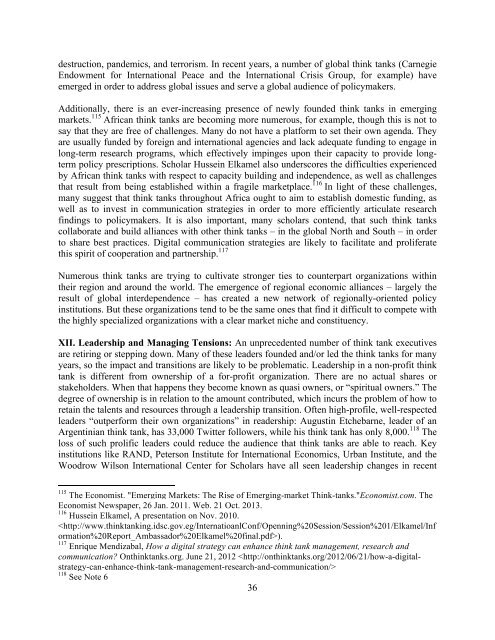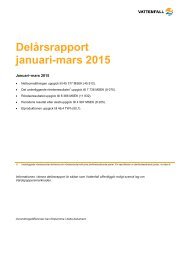2014-global-go-to-think-tank-index-22012015_1
2014-global-go-to-think-tank-index-22012015_1
2014-global-go-to-think-tank-index-22012015_1
- No tags were found...
You also want an ePaper? Increase the reach of your titles
YUMPU automatically turns print PDFs into web optimized ePapers that Google loves.
destruction, pandemics, and terrorism. In recent years, a number of <strong>global</strong> <strong>think</strong> <strong>tank</strong>s (Carnegie<br />
Endowment for International Peace and the International Crisis Group, for example) have<br />
emerged in order <strong>to</strong> address <strong>global</strong> issues and serve a <strong>global</strong> audience of policymakers.<br />
Additionally, there is an ever-increasing presence of newly founded <strong>think</strong> <strong>tank</strong>s in emerging<br />
markets. 115 African <strong>think</strong> <strong>tank</strong>s are becoming more numerous, for example, though this is not <strong>to</strong><br />
say that they are free of challenges. Many do not have a platform <strong>to</strong> set their own agenda. They<br />
are usually funded by foreign and international agencies and lack adequate funding <strong>to</strong> engage in<br />
long-term research programs, which effectively impinges upon their capacity <strong>to</strong> provide longterm<br />
policy prescriptions. Scholar Hussein Elkamel also underscores the difficulties experienced<br />
by African <strong>think</strong> <strong>tank</strong>s with respect <strong>to</strong> capacity building and independence, as well as challenges<br />
that result from being established within a fragile marketplace. 116 In light of these challenges,<br />
many suggest that <strong>think</strong> <strong>tank</strong>s throughout Africa ought <strong>to</strong> aim <strong>to</strong> establish domestic funding, as<br />
well as <strong>to</strong> invest in communication strategies in order <strong>to</strong> more efficiently articulate research<br />
findings <strong>to</strong> policymakers. It is also important, many scholars contend, that such <strong>think</strong> <strong>tank</strong>s<br />
collaborate and build alliances with other <strong>think</strong> <strong>tank</strong>s – in the <strong>global</strong> North and South – in order<br />
<strong>to</strong> share best practices. Digital communication strategies are likely <strong>to</strong> facilitate and proliferate<br />
this spirit of cooperation and partnership. 117<br />
Numerous <strong>think</strong> <strong>tank</strong>s are trying <strong>to</strong> cultivate stronger ties <strong>to</strong> counterpart organizations within<br />
their region and around the world. The emergence of regional economic alliances – largely the<br />
result of <strong>global</strong> interdependence – has created a new network of regionally-oriented policy<br />
institutions. But these organizations tend <strong>to</strong> be the same ones that find it difficult <strong>to</strong> compete with<br />
the highly specialized organizations with a clear market niche and constituency.<br />
XII. Leadership and Managing Tensions: An unprecedented number of <strong>think</strong> <strong>tank</strong> executives<br />
are retiring or stepping down. Many of these leaders founded and/or led the <strong>think</strong> <strong>tank</strong>s for many<br />
years, so the impact and transitions are likely <strong>to</strong> be problematic. Leadership in a non-profit <strong>think</strong><br />
<strong>tank</strong> is different from ownership of a for-profit organization. There are no actual shares or<br />
stakeholders. When that happens they become known as quasi owners, or “spiritual owners.” The<br />
degree of ownership is in relation <strong>to</strong> the amount contributed, which incurs the problem of how <strong>to</strong><br />
retain the talents and resources through a leadership transition. Often high-profile, well-respected<br />
leaders “outperform their own organizations” in readership: Augustin Etchebarne, leader of an<br />
Argentinian <strong>think</strong> <strong>tank</strong>, has 33,000 Twitter followers, while his <strong>think</strong> <strong>tank</strong> has only 8,000. 118 The<br />
loss of such prolific leaders could reduce the audience that <strong>think</strong> <strong>tank</strong>s are able <strong>to</strong> reach. Key<br />
institutions like RAND, Peterson Institute for International Economics, Urban Institute, and the<br />
Woodrow Wilson International Center for Scholars have all seen leadership changes in recent<br />
115 The Economist. "Emerging Markets: The Rise of Emerging-market Think-<strong>tank</strong>s."Economist.com. The<br />
Economist Newspaper, 26 Jan. 2011. Web. 21 Oct. 2013.<br />
116 Hussein Elkamel, A presentation on Nov. 2010.<br />
).<br />
117 Enrique Mendizabal, How a digital strategy can enhance <strong>think</strong> <strong>tank</strong> management, research and<br />
communication On<strong>think</strong><strong>tank</strong>s.org. June 21, 2012 <br />
118 See Note 6<br />
36




